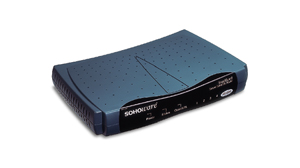Installation
and Setup
I recommend
in any networking project that you install your NIC cards first. If you
are going to have resource problems or detection problems with any computer
I think its better to find that out right off the bat before you get too
involved hooking up your hub/router and running all the wiring. I reused
the FA310TX network cards that came with the Netgear DB104 Network Starter
Kit. I think these are the best NIC cards I've come across in a long time.
I mention this because many of the problems experienced during a networking
install can be traced back to the NIC cards. I've also found some incompatibility
issues between certain NICs and motherboards. These NIC cards have more
than just the standard Link and Activity lights; there are five LED's
on these cards. Talk about information overload, but that's really a good
idea. Having to troubleshoot your install? Why not look behind the computer
at the NIC card and decipher what all those LED's are trying to tell you
about the status of your network? With such good NIC cards available I'm
assured that any problems I could experience were with the router and
not elsewhere in my setup. If you are going to be purchasing NIC cards
to go with this router I highly recommend the FA310TX units. Did I mention
that they are blue? Who wouldn't like that?
 The
actual install of the SOHOware BroadGuard unit was very easy. For first
time installers there is a handy easy install sheet that is packed with
the unit that will show you where to make all your connections. To make
things even easier all the rear connections are clearly labeled. That
makes setting up the actual connections very simple and straight forward.
The
actual install of the SOHOware BroadGuard unit was very easy. For first
time installers there is a handy easy install sheet that is packed with
the unit that will show you where to make all your connections. To make
things even easier all the rear connections are clearly labeled. That
makes setting up the actual connections very simple and straight forward.
Another
thing I always look for with networking components is the included manual.
It is my opinion that these components should be as easy to install for
the first time network installer as well as the seasoned network troubleshooter.
The initial install is also covered in the manual. The directions take
you from the initial connections of the cables all the way through the
software installation and configuration of the TCP/IP protocol. What is
especially nice about this manual is that it is packed with screen shots
from within the browser interface and Windows networking setup. That is
the best way to make it easy for a networking beginner in my opinion.
